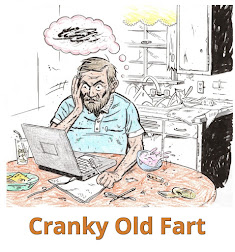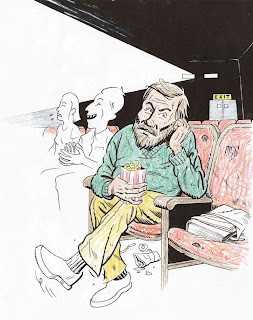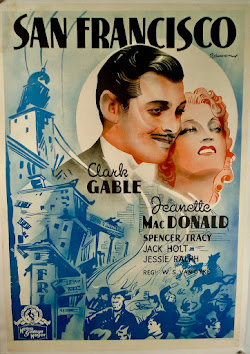It's time for the monthly movie with my brother Clay and his wife Karen, and this time with a long-time friend, Leon. We used to do it via the internet, but now it's live and in person.
The plan this month was that we'd meet for breakfast at Huckleberry Square, a long-standing local favorite in Burien, a south-side Seattle suburb. After that we'd be driving to Leon's house to watch the movie — In the Good Old Summertime (1949), starring Judy Garland and Van Johnson.
Leon lives in Seattle, so going to his house is far, far easier than last month's epic journey to and from Clay's house. I screwed up, though — in my text exchanges with Clay setting this up, when he said we'd meet at noon at Huckleberry Square, I only answered that at noon on Sunday, almost any restaurant will be very, very busy. In hindsight, I should've stressed this more as a problem, not merely a prediction.See, I always avoid the rush at a restaurant. If I'm going to breakfast, I like to be there when they unlock the door, and for lunch I'd rather go hungry than order anything between 11:30 AM and about two in the afternoon. Too many people, too hectic, too much of a chance they'll screw up my order.
Avoiding the rush at restaurants has been my habit for so long that it wasn't until yesterday at Huckleberry Square that I remembered how much I hate being at a restaurant during their busiest time.
When I opened the door there were thirty people in line, talking or looking at their phones or just looking bored until their names would be called, when a table was eventually vacated. Oh yeah, I thought to myself, this is how normal people do breakfast at a restaurant.
So I sighed and leaned on a wall and waited, until Clay and Karen and Leon arrived. They made small talk while we waited, but my talk was smaller. All those people, all that noise, and all my hatred of crowds.
To Clay and Karen and Leon — to anyone who's not nuts like me — queuing with yakking strangers is a brief delay, nothing more. For me, a social situation is difficult already, and the crowd made it worse. Trapped and claustrophobic, I felt the opposite of at ease, and if I'd been alone I would've left. Or course, I also wouldn't have been there, not at noon on a Sunday.
We'd been jam-packed elbow to ankles waiting for twenty minutes, before I noticed that nobody in the waiting room was masked, but all of the staff were. Guess my hatred of crowds had overwhelmed my fear of disease. Belatedly I covered my face with the mask that's always in my pocket, but probably coronavirus came with my breakfast.
While we waited, I looked around the room, and lo, there were huckleberries. Everything's huckleberry. Huckleberry Square sells their own Huckleberry Square syrup and Huckleberry Square mugs and t-shirts. It's locally-owned so I'm supposed to love it, but it feels like a theme park disguised as a restaurant, and the theme is — huckleberries. I don't even like huckleberries, so the allure of Huckleberry Square eluded me, but finally, someone called Clay's name, and it was our turn to be huckleberried alive.
Once we were seated, it was five minutes before anyone came by to pour drinks, and the restaurant was so loud, endless tables all full of people talking and eating, I must've missed the offer of coffee, because water was all any of us drank.
It was another ten minutes before a very bored waiter came to our table, wearing a mask but with his nose, mustache, and upper lip exposed. He took our orders, and 25 minutes after that — well over an hour after we'd arrived — breakfast was finally served. At Bob's Diner, at Little Pat's, an hour after I walk in I'm home again with a full belly.
As for the breakfast itself, it certainly didn't explain the crowd, so I'll explain the crowd: People are idiots. That's the only explanation. Don't follow the crowd, in general, and especially don't follow the crowd to Huckleberry Square.
They served us an ordinary restaurant breakfast. My omelet was pretty good, but the hash browns were severely undercooked and cold in the middle. Leon had ordered a Huckleberry Slam, obviously their riff on the over-advertised "Grand Slam" at Denny's, which he thought implied it would be a sizable breakfast, but wow, the portions were so small even Leon complained, and he's skinny.
He couldn't complain to the waiter, though. The only person who asked us if everything was OK was me. The waiter vanished to a dimension beyond time and space, returning only at the end to bring us the bill, which wasn't split though we'd asked for separate tabs as we ordered. Also, his mask was still dangling so low it served no useful purpose.
Part of the fun of Huckleberry Square is that the restrooms are hidden, and you get to hunt for them, so before I could pee I walked all around the seating areas, searching for a sign or door that said 'restrooms' or 'men'. When I couldn't find a place to pee or an employee to ask, on my second lap around the restaurant I gave up and interrupted an old guy's breakfast with his wife or concubine. "Hey, where's the john?" I asked. You figure an old guy would know, and yup, he pointed me toward the back of one of the dining rooms, where there's no sign, no door, you're simply supposed to sense that if you walk past the last table and turn left there'll be a men's room.
The real frustration came when we tried to pay. The unwritten rule of restaurant tabs is, if your bill is on a tiny tray you pay at the table, and if it's a piece of loose paper you pay at the register. There was no little tray, so we walked to the register. As we walked, Karen even asked an employee, "Do we pay at the register?" The answer was yes, but it turns out it's more complicated than that.
I handed my tab and a twenty to the woman working the register, and she grimaced and said I could only pay with plastic. If you're paying with cash, she said, you go to a different register somewhere else in the restaurant, or maybe you pay your waiter at the table — even now, I'm confused about it. The restaurant was loud, and she mumbled, and I'm hard of hearing, and there were no signs explaining any of this.
Huckleberry Square accepts cash, but not at the cash register — got it. So I put away my money and inserted my card into their machine twice, getting a 'chip malfunction' each time. She told me to swipe the card, which led to a different error message. I tried another card, but she said she needed to reset something first, though she hadn't said it until after I'd inserted the card and gotten a very loud double-beep violation.
This reporter gets cranky sometimes, and this was one of those times. We'd wasted an hour and a half eating a dull meal with crap service in a hectic and unpleasant restaurant, and now they'd been refusing to accept payment for perhaps a minute, so I said, "I'll be paying cash," and left my money on the counter.
I walked out without waiting for the change she wouldn't have had anyway, in her no-cash-allowed cash register, so I'd basically double-tipped at that crappy restaurant — five bucks at the table, and then four bucks and change at the register.
If we'd gone before or after the rush, who knows, maybe I would've found Huckleberry Square charming. At noon on Sunday, though, I hated the place, and now I can't imagine going back any time under any circumstances, unless someone else is buying my breakfast.
I stood outside in the rain until Clay and Karen came out, and thankfully they didn't mention my ill temper at the register. Karen invited me to ride in their car to Leon's house, so I followed them across the parking lot to their SUV.
Not until Leon joined us in the rain a moment later did I understand that riding with them meant Leon would be driving to his house alone. Faux pas. He looked disappointed, and I realized too late that ten minutes riding in Leon's car would've been our only chance to talk, just him and me.
When Clay got behind the wheel and started his car, it began playing audio of some gent with a deep voice and a British accent, saying something like, "—over the lush hills and under a tree that he somehow knew was threatening, a light shone brightly, when all other lights had gone out..." That's not an exact quote, but whatever the voice said, it seemed like a very odd BBC newscast.
Clay clicked it off immediately, and I said something clever like, "Well, that seemed like a very odd BBC newscast."
Clay said, "It's The Lord of the Rings, a book we're listening to," and he clicked a button to make the British voice start talking again. The British voice talked to us all the way to Leon's house, and nobody else got a word in.
Once we arrived, everyone settled onto chairs or the couch, and we all talked for a few minutes. It was the only comfortable chat of the day — no crowd around us, no traffic or J R R Tolkien, just the four of us in Leon's living room. The conversation ended after only a few minutes, though, when Clay and Leon started navigating an app toward our movie.
"It's four bucks," Clay said when he'd found it.
"Oh, don't pay," said Karen. "I've seen this movie, and it's not worth four dollars."
"You OK if we watch something else?" Clay asked me, and I shrugged. I've never seen In the Good Old Summertime, but with the exception of The Wizard of Oz, Judy Garland movies usually disappoint me, and anyway, it's an ancient black-and-white flick, probably in the public domain, and if it's not it should be. I'm a cheapskate, and I agree with Karen — four bucks is four bucks too much for an old movie we're not that eager to see.
What followed was a very brief negotiation about what we'd watch instead, and it turned out to be Jumanji, I thought — the remake of the old Robin Williams movie. It was free on whatever service it was on, so suddenly we were watching Danny DeVito and Danny Glover, and after a while Leon said, "Actually, I think this is the sequel to Jumanji."
I'd never seen the original, if a remake can be called 'original', but this wasn't The Seventh Seal. I was keeping up with the plot and character development despite missing the first movie. Another twenty minutes on, someone else said, "Wait, I think this is the sequel to the sequel, the third Jumanji movie, not the second."
Whatever it was (Jumanji: The Next Level (2019), says Google and IMDB), the movie was painless but brainless. A bunch of people play a video game, with Dwayne Johnson and Kevin Hart as their avatars. It's 89% CGI, 6% lame jokes, 4% amusing jokes, and 1% relevant to human life, but it was vaguely funny watching Johnson imitate DeVito. What I remember most is the very elaborate end credits, suggesting that the people who made this movie were proud of it.
If I'd been watching it alone, I would've clicked it off long before Karen Gillan became Jack Black, but the four of us made occasional wisecracks funnier than the movie itself, and three out of four of us enjoyed the movie.
Perhaps Clay and Karen had somewhere else to be, because when Jumanji 3 ended there was barely time to pee again before we left. Finding the toilet was easier at Leon's house than at Huckleberry Square, though.
Then Clay and Karen drove me home, and it was raining quite hard so I appreciated not having to wait for a bus. As he drove, we heard more of Lord of the Rings.
At home, I took a caffeine pill to ease the headache from lack of coffee at breakfast, and tilted back in my recliner to contemplate my afternoon with Clay and Karen and Leon.
They're people I love, people who love me, and I wouldn't take back the day we'd just spent together… but it all seemed so damned shallow. In four and a half hours together, we talked — really talked — barely at all.
Leon said he was enjoying his retirement, and showed off a shelf he'd added to the wall, and said he'd had the cable disconnected because they raised the price to $70 a month and it's not worth it.
Clay recited a few facts he'd researched on-line about the movie, but it was about the movie we didn't watch, not the movie we did. And then he fell asleep during the Jumanji thing.
Karen said Clay falls asleep often, and that he's going to see a doctor about it in a few weeks. And on the drive to my place, she pointed out the Boeing facility where she'd worked before her retirement.
And what did I say all day? Not much, and I don't remember much of that, except what I've typed above. Oh, and after the movie, I tried to guide Clay through the rain and traffic, up the hill, turn right at the 7-Eleven, etc, toward my house. That was our conversation.
It's mostly on me, I know. I'm the introvert. I'm the missing man, even when I'm there. Got nothing much to say, and I don't ask many questions to keep a conversation going, so it's my fault, more than theirs. At the end of the day, though, sitting in my recliner again — alone — was a relief.
5/16/2022












.jpg)



